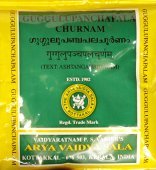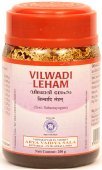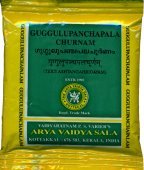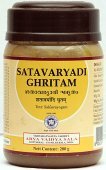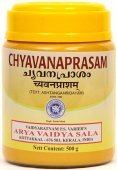Truti, Truṭi, Truṭī: 18 definitions
Introduction:
Truti means something in Hinduism, Sanskrit, Marathi, Hindi, biology. If you want to know the exact meaning, history, etymology or English translation of this term then check out the descriptions on this page. Add your comment or reference to a book if you want to contribute to this summary article.
In Hinduism
Ayurveda (science of life)
Rasashastra (Alchemy and Herbo-Mineral preparations)
Source: Wisdom Library: Rasa-śāstraTruṭi (त्रुटि):—Sanskrit word for a unit of measurement of weight, according to the Rasa-darpaṇa (Sanskrit work on rasaśāstra, or Medical Alchemy). Six aṇus constitute one truṭi, and six truṭis constitute one likṣā.

Āyurveda (आयुर्वेद, ayurveda) is a branch of Indian science dealing with medicine, herbalism, taxology, anatomy, surgery, alchemy and related topics. Traditional practice of Āyurveda in ancient India dates back to at least the first millenium BC. Literature is commonly written in Sanskrit using various poetic metres.
Purana and Itihasa (epic history)
Source: archive.org: Puranic Encyclopedia1) Truṭi (त्रुटि).—Thirty alpakālas make one Truṭi. (See under Kālamāna).
2) Truṭi (त्रुटि).—A female attendant of Subrahmaṇya. (Śloka 17, Chapter 46, Śalya Parva).
Source: Cologne Digital Sanskrit Dictionaries: The Purana IndexTruṭi (त्रुटि).—A Śakti resident of Ṣoḍaśapatrābja.*
- * Brahmāṇḍa-purāṇa IV. 32. 14.

The Purana (पुराण, purāṇas) refers to Sanskrit literature preserving ancient India’s vast cultural history, including historical legends, religious ceremonies, various arts and sciences. The eighteen mahapuranas total over 400,000 shlokas (metrical couplets) and date to at least several centuries BCE.
Jyotisha (astronomy and astrology)
Source: Wisdom Library: Brihat Samhita by VarahamihiraTruṭi (त्रुटि) refers to “33, 75th of a second”, according to the Bṛhatsaṃhitā (chapter 2), an encyclopedic Sanskrit work written by Varāhamihira mainly focusing on the science of ancient Indian astronomy astronomy (Jyotiṣa).—Accordingly, “We shall now proceed to give a brief description of (the qualifications of) a jyotiṣaka. [...] He must have a correct, knowledge of a yuga (43,20,000 Solar years), varṣa (a solar year), āyana (6 solar months), ṛtu (2 solar months), māsa (a solar month), pakṣa (15 solar days), ahorātra (a solar day), yama (one-eighth of a solar day), muhūrta (one-thirtieth of a solar day), nāḍī (one-sixtieth of a solar day or 24 minutes), vināḍi (one sixtieth of a nāḍī or 24 seconds), prāṇa (4 seconds) truṭi (33, 75th of a second) and parts of a truṭi and other divisions of time and also of divisions of space”.

Jyotisha (ज्योतिष, jyotiṣa or jyotish) refers to ‘astronomy’ or “Vedic astrology” and represents the fifth of the six Vedangas (additional sciences to be studied along with the Vedas). Jyotisha concerns itself with the study and prediction of the movements of celestial bodies, in order to calculate the auspicious time for rituals and ceremonies.
Shaktism (Shakta philosophy)
Source: Google Books: ManthanabhairavatantramTruṭi (त्रुटि) refers to a “moment of time”, according to the Śrīmatottara-tantra, an expansion of the Kubjikāmatatantra: the earliest popular and most authoritative Tantra of the Kubjikā cult.—Accordingly, while describing Trikhaṇḍā: “That energy which is supreme, subtle, endless, and pervasive (is the goddess) who is consciousness. Supreme and divine, she abides (in the objective sphere as each) moment of time [i.e., truṭi-rūpā]. Endless, pervasive and divine, she resides in the Void (of the transcendent) and her form is the Point. She is the divine nectar within emission. She is activity (itself) that resides in the (pure transcendent reality) devoid of (phenomenal) activity (acāra). (Although she is thus) unmanifest, she possesses a manifest (form). (Now) I will explain her manifest (form)”.

Shakta (शाक्त, śākta) or Shaktism (śāktism) represents a tradition of Hinduism where the Goddess (Devi) is revered and worshipped. Shakta literature includes a range of scriptures, including various Agamas and Tantras, although its roots may be traced back to the Vedas.
Biology (plants and animals)
Source: Google Books: CRC World Dictionary (Regional names)Truti in India is the name of a plant defined with Elettaria cardamomum in various botanical sources. This page contains potential references in Ayurveda, modern medicine, and other folk traditions or local practices It has the synonym Amomum repens Sonn. (among others).
Example references for further research on medicinal uses or toxicity (see latin names for full list):
· Transactions of the Horticultural Society of London (1812)
· Flora Peruviana, et Chilensis (1798)
· Enumeratio Plantarum Horti regii berolinensis: ... Supplementum (1814)
· Species Plantarum (1753)
· Asiatic Researches, or ‘Transactions of the Society’ (1810)
· Nomenclator Botanicus (1797)
If you are looking for specific details regarding Truti, for example health benefits, chemical composition, extract dosage, side effects, diet and recipes, pregnancy safety, have a look at these references.

This sections includes definitions from the five kingdoms of living things: Animals, Plants, Fungi, Protists and Monera. It will include both the official binomial nomenclature (scientific names usually in Latin) as well as regional spellings and variants.
Languages of India and abroad
Marathi-English dictionary
Source: DDSA: The Molesworth Marathi and English Dictionarytruṭi (त्रुटि).—f S A period of 18 nimēṣa or twinklings of the eye. Ex. taṃva tō utaralā udarānta || truṭimātra na lāgatāṃ ||.
Source: DDSA: The Aryabhusan school dictionary, Marathi-Englishtruṭi (त्रुटि).—f A period of 18 twinklings of the eye.
Marathi is an Indo-European language having over 70 million native speakers people in (predominantly) Maharashtra India. Marathi, like many other Indo-Aryan languages, evolved from early forms of Prakrit, which itself is a subset of Sanskrit, one of the most ancient languages of the world.
Sanskrit dictionary
Source: DDSA: The practical Sanskrit-English dictionaryTruṭi (त्रुटि) or Truṭī (त्रुटी).—f. [truṭ-in vā ṅīp]
1) Cutting, tearing.
2) A small part, an atom.
3) A very minute space of time equal to 1/4 of a Kṣaṇa; or 1/2 of a Lava; Mahābhārata (Bombay) 1.25.14; Bhāg;1.13.4.
4) Doubt, uncertainty.
5) Loss, destruction.
6) Small cardamoms (the plant).
Derivable forms: truṭiḥ (त्रुटिः).
Source: Cologne Digital Sanskrit Dictionaries: Benfey Sanskrit-English DictionaryTruṭi (त्रुटि).—[truṭ + i], f. 1. A moment as measure of time, Mahābhārata 1, 1292. 2. Small cardamoms, [Suśruta] 2, 505. 1.
Source: Cologne Digital Sanskrit Dictionaries: Cappeller Sanskrit-English DictionaryTruṭi (त्रुटि).—[feminine] a little bit, atom; a very minute space of time.
Source: Cologne Digital Sanskrit Dictionaries: Monier-Williams Sanskrit-English Dictionary1) Truṭi (त्रुटि):—[from truṭ] f. ([Siddhānta-kaumudī stry. 26]) an atom (= 7 Reṇus, [Lalita-vistara xii, 176])
2) [v.s. ...] a very minute space of time, [Mahābhārata i, 1292; Harivaṃśa 9529; Varāha-mihira’s Bṛhat-saṃhitā ii, 0/1; Sūryasiddhānta; Bhāgavata-purāṇa iii, 11, 6]
3) [v.s. ...] [x]
4) [v.s. ...] small cardamoms, [Suśruta vi]
5) [v.s. ...] doubt, [cf. Lexicographers, esp. such as amarasiṃha, halāyudha, hemacandra, etc.]
6) [v.s. ...] cutting, breaking, [Horace H. Wilson]
7) [v.s. ...] loss, destruction, [Horace H. Wilson]
8) [v.s. ...] breaking a promise, [Horace H. Wilson]
9) [v.s. ...] Name of one of the mothers attending on Skanda, [Mahābhārata ix, 2635]
10) [v.s. ...] See troṭi.
11) Truṭī (त्रुटी):—[from truṭita > truṭ] f. = ṭi, [cf. Lexicographers, esp. such as amarasiṃha, halāyudha, hemacandra, etc. [Scholiast or Commentator]]
Source: Cologne Digital Sanskrit Dictionaries: Yates Sanskrit-English DictionaryTruṭi (त्रुटि):—[(ṭiḥ-ṭī)] 2. 3. f. Cutting; loss; small cardamoms; a moment, a measure of time next to trasarenu; doubt; an atom; a fault.
Source: DDSA: Paia-sadda-mahannavo; a comprehensive Prakrit Hindi dictionary (S)Truṭi (त्रुटि) in the Sanskrit language is related to the Prakrit word: Tuḍi.
[Sanskrit to German]
Sanskrit, also spelled संस्कृतम् (saṃskṛtam), is an ancient language of India commonly seen as the grandmother of the Indo-European language family (even English!). Closely allied with Prakrit and Pali, Sanskrit is more exhaustive in both grammar and terms and has the most extensive collection of literature in the world, greatly surpassing its sister-languages Greek and Latin.
Hindi dictionary
Source: DDSA: A practical Hindi-English dictionaryTruṭi (त्रुटि):—(nf) an error, mistake; defect, deficiency; ~[pūrṇa] erroneous, defective; ~[ta] broken.
...
Kannada-English dictionary
Source: Alar: Kannada-English corpusTruṭi (ತ್ರುಟಿ):—
1) [noun] a tiny particle of anything; a jot; an atom.
2) [noun] a very minute space of time.
3) [noun] lack of something necessary for completeness; deficiency; shortcoming.
4) [noun] the plant Alpinia cardamomum; small cardamoms.
5) [noun] the act of cutting or breaking (something).
6) [noun] a piece broken from the whole.
7) [noun] the act or an instance of breaking one’s promise.
8) [noun] destruction; loss.
9) [noun] uncertainty; doubt.
10) [noun] a kind of tree.
Kannada is a Dravidian language (as opposed to the Indo-European language family) mainly spoken in the southwestern region of India.
See also (Relevant definitions)
Starts with: Trutibija, Trutih, Trutipattra, Trutirupa, Trutishas, Trutita, Trutitanga, Trutitavat, Trutitri, Trutivija.
Ends with: Aretruti, Nistruti, Sitruti.
Full-text (+22): Trutishas, Vedha, Trutyavayava, Trutivija, Nistruti, Rangamatar, Tuti, Vatayanarajas, Trutipattra, Trutibija, Tiralati, Nishkuti, Troti, Vatayanacchidrarajas, Cantuti, Tudi, Laghvaksharaka, Abrajas, Anu, Liksha.
Relevant text
Search found 23 books and stories containing Truti, Truṭi, Truṭī; (plurals include: Trutis, Truṭis, Truṭīs). You can also click to the full overview containing English textual excerpts. Below are direct links for the most relevant articles:
Puranic encyclopaedia (by Vettam Mani)
The Bhagavata Purana (by G. V. Tagare)
Chapter 11 - The concept of Time: Manvantaras and life-spans of Men and Gods < [Book 3 - Third Skandha]
Amarakoshodghatana of Kshirasvamin (study) (by A. Yamuna Devi)
Units of time < [Chapter 3 - Social Aspects]
Garga Samhita (English) (by Danavir Goswami)
Verse 2.8.35 < [Chapter 8 - Description of Seeing Lord Kṛṣṇa]
Kautilya Arthashastra (by R. Shamasastry)
Chapter 20 - Measurement of Space and Time < [Book 2 - The duties of Government Superintendents]
Brihad Bhagavatamrita (commentary) (by Śrī Śrīmad Bhaktivedānta Nārāyana Gosvāmī Mahārāja)
Verse 1.6.104-105 < [Chapter 6 - Priyatama (the most beloved devotees)]
Related products
(+1 more products available)
